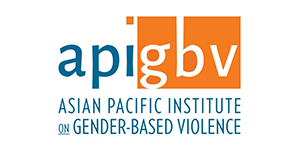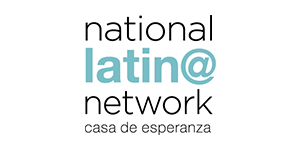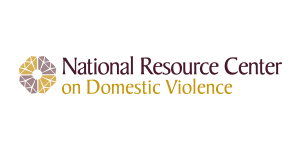Power Through Partnerships
A CBPR Toolkit for Domestic Violence Researchers
Ready to initiate CBPR in your community? Use These Extra Tools To Guide Action.
Download these tools with the full toolkit or each individually to save valuable time and resources.
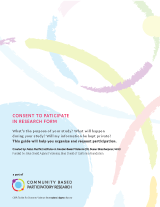 Consent to Participate in Research Form
Consent to Participate in Research Form
What's the purpose of your study? What will happen during your study? Will my information be kept private? Download this and let others know.
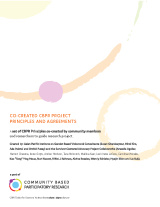 Co-created CBPR Project Principles and Agreements
Co-created CBPR Project Principles and Agreements
Build your efforts on our solid foundation of CBPR principles based on 30 years of our collective lived experiences. Download and get started.
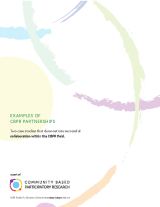 Examples of
Examples ofCBPR Partnerships
Two case studies that demonstrate successful collaboration within the CBPR field. Download and read for additional inspiration.
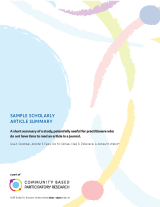 Sample Scholarly
Sample ScholarlyArticle Summary
A short summary of a study, potentially useful for practitioners who do not have time to read an article in a journal. Download and see how.
- The CBPR Partnership Academy is a training and mentoring program designed for new community-academic partnerships interested in exploring and engaging in a CBPR approach to eliminate health inequities in their communities.
- The Community Campus Partnerships for Health (CCHP) is a nonprofit membership organization that promotes health equity and social justice through partnerships between communities and academic institutions. It offers a number of useful programs and resources.
- The CBPR listserv is designed to serve the growing network of people involved and interested in CBPR and other types of community-academic research partnerships. People from community organizations, colleges and universities, public and private funding agencies, decision makers and policy makers, and others are all encouraged to subscribe.
- The Community-Engaged Scholarship Toolkit assists graduate students and faculty to carefully document their community-engaged scholarship and produce strong portfolios for promotion and tenure.
- For researchers in university settings, be on the lookout for CBPR workshops and trainings being held locally. As interest in CBPR approaches is growing across many fields, universities are increasingly offering training and workshop opportunities for their faculty. By attending such meetings, researchers have the opportunity to learn from local experts as well as build new networks and relationships with other CBPR scholars.
- Consider creating your own CBPR network and mentoring relationships. Reach out to other scholars who are using CBPR methods in their own work to invite them for coffee, lunch, and other meetings. If you are an early career scholar, making connections with more experienced CBPR researchers can be beneficial. Nonetheless, early career scholars can also help provide support, encouragement and recommendations to one another. One of the authors of this Toolkit, holds regular “walk and talk” meetings with colleagues where they problem solve, discuss projects, and consider new ideas while exercising. Such meetings have led to novel projects, presentations and papers.
- CES4Health is a unique online database of peer-reviewed products of community-engaged scholarship that are in forms other than journal articles. CES4Health widely disseminates high quality products that can improve the health of communities and "count" in the faculty promotion and tenure process.
- Guidelines for writing manuscripts about community-based participatory research for peer-reviewed journals provides helpful insights.
- Racial Equity Tools provides critical high‐quality contextual information and resources to emerging CBPR researchers about communities they may be working with, and also provides another outlet through which to disseminate toolkits, research briefs, and related resources via a respected source.
- Examples of journals that publish articles on the process and outcomes of CBPR: Action Science, Journal of Community Psychology, American Journal of Community Psychology, Journal of Community Practice, Journal of Healthcare for the Poor and Underserved, Gateways: International Journal of Community Research and Engagement, and American Journal of Evaluation.
- The Community Toolbox is a free, online resource for those working to build healthier communities and bring about social change. It offers practical, step-by-step guidance in community-building skills, how to conduct a community assessment, develop a strategic plan, write a grant, or evaluate your efforts. The information is written in a straightforward, easy to understand style, and is available in English and Spanish.
- A series of briefs and reports on achieving successful researcher-practitioner partnerships in the criminal justice arena, funded by the National Institute of Justice, Office of Justice Programs, can provide additional guidance:
- Recommendations for Collaborating Successfully With Academic Researchers - (pdf, 8 pages)
- How Researchers Can Develop Successful Relationships with Criminal Justice Practitioners - (pdf, 8 pages)
- Strategies for Successfully Developing and Disseminating Useful Products from Researcher- Practitioner Collaborations - (pdf, 5 pages)
- Highlights and Lowlights of Researcher-Practitioner Collaborations in the Criminal Justice System - (pdf, 7 pages)
- Criminal Justice System State Administrative Agencies: Research Capacity and Experience with Research Collaborations - (pdf, 8 pages)
- Evidence-Based Policy and Practice: The Role of the State in Advancing Criminal Justice Research - (pdf, 5 pages)
- The Role of State Administrative Agencies in Advancing Criminal Justice Research - (pdf, 32 pages)
- Guidelines for Successful Researcher-Practitioner Partnerships in the Criminal Justice System - (pdf, 32 pages)
- Racial Equity Tools provides critical high‐quality contextual information and resources to emerging CBPR researchers about communities they may be working with, and also provides another outlet through which to disseminate toolkits, research briefs, and related resources via a respected source.
A Special Thanks...
We are grateful for the enormous contribution from doctoral students at Boston College and Simmons School of Social Work, our video editor, and of course WT Grant Foundation - who provided the initial investment in this project. We also thank the National Resource Center on Domestic Violence, who decided that this toolkit should be more than a local endeavor and supported our efforts to expand it.









